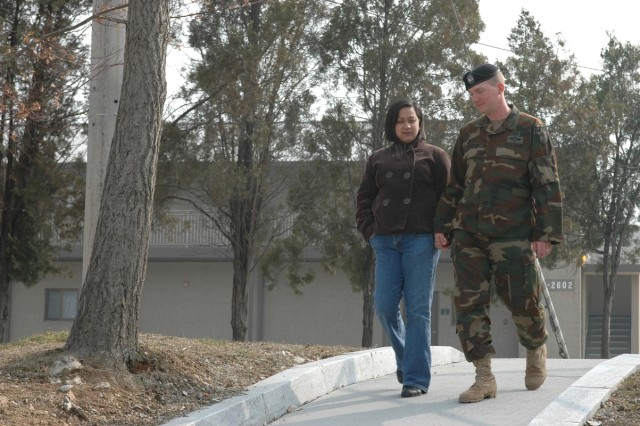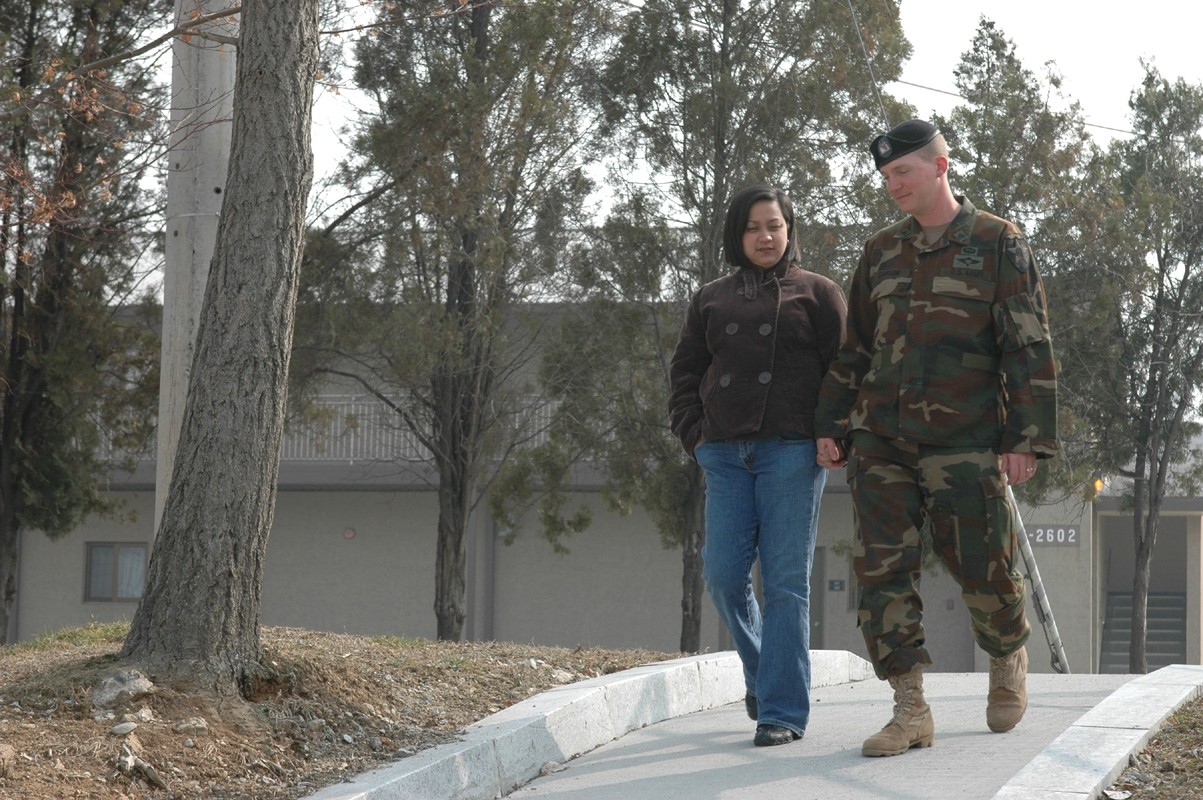A lot more goes into getting married than some couples may think, especially for couples coming from different cultures.
Sgt. Jeffrey Cahoon, a motor transport operator from Company B, 702nd Brigade Support Battalion, and his wife Bernadette found out just how true this is.
The Cahoons, who have been married for 13 months, went through a lot from the day they first met to the day they said "I do." Some of the unnecessary stress they endured could have been avoided had the new USFK Marriage Regulation 600-240 been enacted at the time, Jeffrey said.
"We met the day I got out of PLDC (now known as Warrior Leader Course)," he said.
Although it wasn't necessarily love at first sight, they grew on each other.
"When we first met, the first time I saw him, I told my friends, 'He looks snobby, I don't like him,'" Bernadette said. "Now look at us. I'm really blessed to have him in my life."
After seeing each other for a while, both knew their relationship was destined for much more.
"When things started getting serious, I knew this was the person I wanted to be with," he said.
"I told myself, this is the right person for me. I'm so thankful to God that He gave me the person I was asking for," Bernadette said.
Taking the first step
Before the new USFK marriage regulation, there was no clear guidance for servicemembers wanting to marry while in Korea, so Jeffrey took the initiative and spoke with his chain of command.
"I asked if I could speak with someone about getting married, and my first sergeant told me to come into his office," he said. "He said how it was a big step and that there are a lot of things to consider. He also wanted me to speak with the chaplain."
"A few days later he saw me and gave me a report he found on cultural differences in marriages," he said. "He wanted me to read and understand what I was getting into. He took his own time to find that information for me."
Shortly afterward, Jeffrey met with the chaplain. She asked him what makes Bernadette the only person for him.
"I didn't have the best explanation," he said. "I just knew this was the right person for me."
After his meeting, and with his chaplain's blessing, Jeffrey and Bernadette went to the U.S. Embassy in Seoul with marriage paperwork in hand.
"We got married the same day we went," he said.
"It went so fast," Bernadette said. "We didn't even realize we had gotten married yet. All they had to do was stamp a paper."
As easy as it was for them to get married, the couple was not prepared for the next step in the process.
Frustration begins
"After we got married, they gave us the paperwork to apply for a U.S. immigrant visa," Jeffrey said. "It was kind of like, 'Congratulations on your marriage, now this is what you have to do to take her to the States.'"
With an endless number of documents to get, time seemed to be running out for the couple. Since he was only on a one-year tour in Korea, Jeffrey would soon be leaving for another duty station, while still working through the immigration process.
"It's a bad feeling, knowing you've found someone you care about, and then you have that possibility that they can't come with you," he said. "It will rip your heart out of your chest."
Luckily, Jeffrey was able to take advantage of the Assignment Incentive Pay program, even though he already had orders to Fort Hood, Texas, so he could stay in Korea and finish the process.
The waiting game
Halfway through the process, the couple hit another snag. Bernadette's 7-year-old son lives with her parents in the Philippines. In order to submit the immigration packet, they needed a copy of his birth certificate.
"We couldn't continue with the process without it, and we didn't have it," he said. "Then we had to call the family in the Philippines to mail it to us before they would restart the process. Basically, we were on hold."
Finally, after gathering all the needed documents, from medical exams to legal affidavits, they submitted their immigration packet. This was forwarded to the Department of Homeland Security, which would later assign them an investigation case number.
"That was the most stressful thing, waiting for the case number," he said. "If you don't get that, you're pretty much being told, 'We're sorry.'"
After much stress and anticipation, they finally received their case number and were given an appointment. With the interviews done and approved, all that was left was paying for the visa.
Had USFK Regulation 600-240 been in place before they were married, they would have had a much easier time, he said. Under the new regulation, servicemembers desiring to marry a non-U.S. citizen in Korea now have a guided process to follow. This allows the couple to know exactly what they need before getting married and what the next step is during the process.
"It would have helped us know what we needed to get done and eliminated unnecessary stress," he said. "Some Soldiers don't even know what they need to get married."
Also, the servicemember's chain of command will now play a more active role in the process, including meetings with the servicemember's battalion commander or equivalent to ensure servicemembers are aware of the choice they are making.
Adapting to a new life
Like all couples, even Jeffrey and Bernadette had to adjust to their differences.
"I was a little nervous at first," he said. "I'm 31 and she's 33. We're older, but we knew what we wanted. There's a cultural difference, but the main thing is we respect each other. You have to go into a cultural marriage open-minded."
They both agree their differences have never been a problem because of mutual respect.
"Respect is important in any relationship," Bernadette said. "Without respect, the relationship is useless. That's what my mom has always told me."
"It is a good foundation for a new couple beginning a marriage. I told him before, if you're going to marry a Filipina, you have to be ready to eat my food," she said with a laugh.
Now, 13 months and one visa later, the couple reflects back on how things could have been easier for them and look ahead to see what the future holds.
"Making sure you have the proper documentation helps take a lot of stress off," he said. "If you don't have it, you can't proceed. If you have a spouse that has been married before or has children, you need the proper papers."
The next step they have to take will bring them more than 10,000 miles to West Virginia.
"We have to use the visa within six months, or it is void," he said. "After that we can start the process for a green card."
"This is the first time I'm going to the States," she said. "I'm so happy to meet the family."


Social Sharing